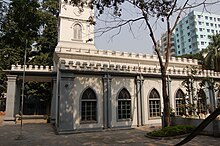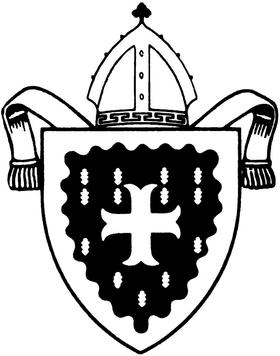
The Anglican Church of Korea is the province of the Anglican Communion in North and South Korea. Founded in 1889, it has over 120 parish and mission churches with a total membership of roughly 65,000 people.

The Church of North India (CNI) is the dominant united Protestant church in northern India. It was established on 29 November 1970 by bringing together most of the Protestant churches working in northern India. It is a province of the worldwide Anglican Communion and a member of the World Methodist Council and the World Communion of Reformed Churches. The merger, which had been in discussions since 1929, came eventually between the Church of India, Pakistan, Burma and Ceylon (Anglican), the Methodist Church, Disciples of Christ, and some congregations from the United Church of Northern India.
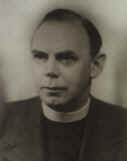
Robert Wright Stopford, was a British Anglican bishop.

Christians in Bangladesh account for 0.30% of the nation's population as of 2022 census. Together with Judaism and Buddhism, they account for 1% of the population. Islam accounts for 91.04% of the country's religion, followed by Hinduism at 7.95% as per 2022 census.

The Church of Bangladesh is a united Protestant church formed by the union of various Protestant churches in Bangladesh, principally the Anglican and Presbyterian denominations. The Church of Bangladesh is a member of the Anglican Communion and the World Communion of Reformed Churches.
The Church of Pakistan is a united Protestant Church in Pakistan founded in 1970; it holds membership in the Anglican Communion, the World Communion of Reformed Churches, and the World Methodist Council.
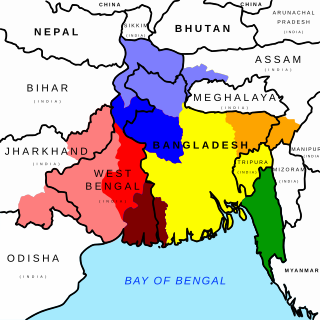
Bengali Christians are adherents of Christianity among the Bengali people. Christianity took root in Bengal after the arrival of Portuguese voyagers in the 16th century. It witnessed further conversions among the Bengali upper-caste elite during the 19th century Bengali Renaissance.
The Anglican Consultative Council (ACC) is one of the four "Instruments of Communion" of the Anglican Communion. It was created by a resolution of the 1968 Lambeth Conference. The council, which includes Anglican bishops, other clergy, and laity, meets every two or three years in different parts of the world.

The Anglican Church of Papua New Guinea is a province of the Anglican Communion. It was created in 1977 when the Province of Papua New Guinea became independent from the Province of Queensland in the Church of England in Australia following Papua New Guinea's independence in 1975.
The Diocese of Calcutta was established in 1813 as part of the Church of England. It is led by the Bishop of Calcutta and the first bishop was Thomas Middleton (1814–1822) and the second Reginald Heber (1823–1826). Under the sixth bishop Daniel Wilson (1832–1858), the see was made Metropolitan when two more dioceses in India came into being.
The Archbishop of Melanesia is the spiritual head of the Anglican Church of Melanesia, which is a province of the Anglican Communion in the South Pacific region, covering the nations of Solomon Islands and Vanuatu. From 1861 until the inauguration of Church of the Province of Melanesia in 1975, the Bishop of Melanesia was the head of the Diocese of Melanesia.

St Thomas Cathedral Church is a cathedral belonging to the Diocese of Dhaka of the Church of Bangladesh, which is a United Protestant denomination that formed as a result of a merger between the Anglican and Presbyterian churches in the region. It is the seat of the diocese. The church premise was in an area of lush greeneries with the famous Bahadur Shah Park at a stone's throw distance on the south. The north–south axial Nawabpur Road/Johnson Road, the most important commercial street connecting the old part of the city with the new, is on the west and separated the area from the court, Bank, DC's office and Jagannath University buildings across it. In fact the church overlooking the greens is a major focal of the city centre in the nineteenth century.
Samuel Sammy Robert Azariah is a Protestant Pakistani bishop in the Church of Pakistan, a united Protestant denomination that holds membership in the Anglican Communion, World Methodist Council and World Communion of Reformed Churches. He is married to Khushnud and they have three daughters.
The Anglican Bishop of Santiago is a bishop in the Anglican communion, the head of the Anglican Diocese of Santiago within the Anglican Church of Chile. Until 2018, the bishop and diocese were "of Chile", in the Anglican Church of South America.
Paul Shishir Sarker is a Bangladeshi Church of Bangladesh bishop. He was from 2007 to 2019 the Archbishop of Dhaka & the Moderator of the Church of Bangladesh, a united Protestant Church that holds membership in the World Communion of Reformed Churches and the Anglican Communion.
The Anglican dioceses of Maseno are the Anglican presence in and around Maseno, the Winam Gulf of Lake Victoria, and the western slopes of Mount Elgon, south-west Kenya; they are part of the Anglican Church of Kenya. The remaining dioceses of the Church area in the areas of Mombasa, of Mount Kenya, and of Nakuru.
The Anglican dioceses of Eastern Uganda are the Anglican presence in (roughly) the Eastern Region, Uganda; they are part of the Church of Uganda. The remaining dioceses of the Church are in the areas of Buganda, of Northern Uganda, of Ankole and Kigezi, and of Rwenzori.
The Anglican dioceses of Burundi are the Anglican presence in Burundi; together they form the Province of the Anglican Church of Burundi. The Anglican churches of the area were under the authority of the Archbishop of Canterbury until 1965, when the Province of Uganda and Ruanda-Urundi was created; Burundi was then part of the Province of Rwanda, Burundi, and Boga-Zaire from 1980 until its own church province was erected in 1992.
The Church of Bangladesh Diocese of Kushtia is one of three dioceses of the Church of Bangladesh. It was formed in 1990 out of the Diocese of Dhaka, and its first three bishops each went on to become archbishop of Dhaka and primate & moderator of the Church of Bangladesh.
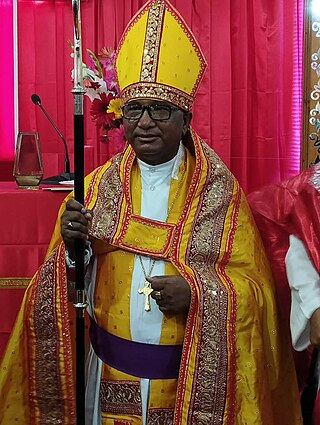
The Archbishop of Dhaka of Church of Bangladesh is the senior bishop and a principal leader of Church of Bangladesh and the bishop of Diocese of Dhaka. He is also be the Primate of All Church of Bangladesh. As the Archbishop of Dhaka, he is the moderator of the synod of Church of Bangladesh. The current archbishop is Samuel Sunil Mankhin, who was enthroned at St. Thomas Cathedral on 2019. Mankhin is the 4th person to hold the position, as part of a line of succession of, Barnabas Dejen Mondal, who was consecrated as 1st Archbishop of Dhaka.
